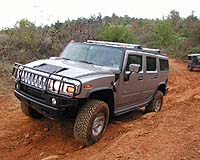 |
Vienna (AFP) June 9, 2009 Fuel-efficient and environmentally-friendly, hybrid buses starred at a public transportation congress in Vienna this week, but they still face a long road before becoming cost-effective on a mass scale. With fuel consumption cut by 20 to 30 percent and CO2 emissions down by about as much -- thanks to power generated during braking -- the hybrid diesel-electric bus is the way of the future, manufacturers say. "Eventually, there won't be any reason to drive with a traditional diesel anymore," Per-Martin Johansson, spokesman for Swedish carmaker Volvo, the world number-two after selling 10,000 buses last year, told AFP. "Besides the immediate environmental benefit, the 40-percent premium is redeemed within five to seven years," said Johansson, who spoke at the International Association of Public Transport (UITP) world congress ending Thursday. First launched by Poland's Solaris and Belgium's Vanhool, hybrid buses are now gaining momentum: both Volvo and Germany's Daimler, the world leader with 42,000 buses sold in 2008, have said they will begin mass production within a year, while Man, another German company, is looking at 2011. But for now, orders are still low in Europe, where only Vanhool has started mass-producing, following a commission by the Belgian public transportation company VVM for 79 hybrid buses. Solaris hopes to follow suit with "contracts for 20 to 30 units," said spokesman Mateusz Figaszewski. The Polish company began selling its prototype in 2006 and has just sold seven more in Paris and Strasbourg, France. Meanwhile, the bigger car companies, who came late into the game, have been left with the scraps: Volvo has just sold six hybrid red double-decker buses to London, while Sweden's Scania has sold six more to Stockholm. At a time of economic crisis, public transportation companies are reluctant to invest massively in a technology with such a high starting price, experts say. "Hybrid buses will only really take off with governmental help," said Man spokesman Thorsten Wagner. "With that, this technology can take over 50 percent of the market within five or 10 years. Without, it probably won't surpass 20 percent and will only catch on in places that want to appear environmentally-friendly," he said. The exception is in North America where hybrid buses have been present for the past decade. Daimler Buses, for example, has already sold 1,700 units through its Orion branch and has another 1,100 on order. But, Daimler Bus director Hartmut Schick said, "This market is completely distinctive." Even more costly is the hydrogen hybrid bus, already developed by some manufacturers, but this vehicle may never get past the prototype stage. A third-generation of this model -- with fuel cell -- was presented by Daimler at the UITP congress and is still more expensive than a diesel bus, making it difficult to recoup the cost. Daimler, which has already sold about 30 hydrogen prototypes since 2003, now hopes to sell 30 more, while Vanhool has reported 16 orders from the United States. "In this case, it's not about financial reasoning but about paving the way for the future," Schick said. Man, which abandoned hydrogen buses after selling about 15 in Germany, disagrees. "At this point, we don't see a solution to the question of cost-efficiency and the environmental impact of hydrogen production," Wagner said. For Solaris as well, there is no point investing in such complex technology. "The bus of the future will be entirely electric, after batteries have been perfected. It's as simple as that," Figaszewski said. "Even the diesel hybrid is bound to disappear." Share This Article With Planet Earth
Related Links Car Technology at SpaceMart.com
 China bid for GM brand Hummer triggers skepticism
China bid for GM brand Hummer triggers skepticismBeijing (AFP) June 9, 2009 The announcement from little-known Chinese company Tengzhong that it wants to buy the Hummer brand from troubled General Motors has led many to question just how plausible the deal really is. What has perplexed Chinese analysts the most is the company's lack of expertise in either international trade or making automobiles. "Tengzhong is just a privately owned company that has no ... read more |
|
| The content herein, unless otherwise known to be public domain, are Copyright 1995-2009 - SpaceDaily. AFP and UPI Wire Stories are copyright Agence France-Presse and United Press International. ESA Portal Reports are copyright European Space Agency. All NASA sourced material is public domain. Additional copyrights may apply in whole or part to other bona fide parties. Advertising does not imply endorsement,agreement or approval of any opinions, statements or information provided by SpaceDaily on any Web page published or hosted by SpaceDaily. Privacy Statement |